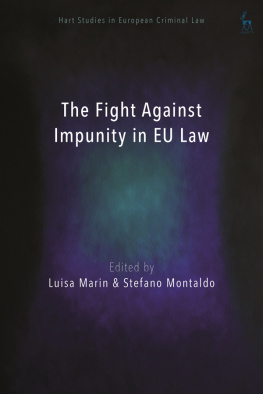Luisa Marin - The Fight Against Impunity in EU Law
Here you can read online Luisa Marin - The Fight Against Impunity in EU Law full text of the book (entire story) in english for free. Download pdf and epub, get meaning, cover and reviews about this ebook. year: 2020, publisher: Bloomsbury UK, genre: Home and family. Description of the work, (preface) as well as reviews are available. Best literature library LitArk.com created for fans of good reading and offers a wide selection of genres:
Romance novel
Science fiction
Adventure
Detective
Science
History
Home and family
Prose
Art
Politics
Computer
Non-fiction
Religion
Business
Children
Humor
Choose a favorite category and find really read worthwhile books. Enjoy immersion in the world of imagination, feel the emotions of the characters or learn something new for yourself, make an fascinating discovery.
- Book:The Fight Against Impunity in EU Law
- Author:
- Publisher:Bloomsbury UK
- Genre:
- Year:2020
- Rating:3 / 5
- Favourites:Add to favourites
- Your mark:
- 60
- 1
- 2
- 3
- 4
- 5
The Fight Against Impunity in EU Law: summary, description and annotation
We offer to read an annotation, description, summary or preface (depends on what the author of the book "The Fight Against Impunity in EU Law" wrote himself). If you haven't found the necessary information about the book — write in the comments, we will try to find it.
The Fight Against Impunity in EU Law — read online for free the complete book (whole text) full work
Below is the text of the book, divided by pages. System saving the place of the last page read, allows you to conveniently read the book "The Fight Against Impunity in EU Law" online for free, without having to search again every time where you left off. Put a bookmark, and you can go to the page where you finished reading at any time.
Font size:
Interval:
Bookmark:

This book is an outcome of the research project of the University of Turin Offenders Rehabilitation in the European Union, coordinated by Professor Stefano Montaldo and funded by Fondazione Compagnia di San Paolo.

LUISA MARIN AND STEFANO MONTALDO
Impunity is a deep-rooted and recurring concern for criminal law, which questions the actual capacity of a penal system to avoid a crime going unpunished and to more generally secure sound and effective administration of justice. This concept embodies a legitimate objective in the public interest and usually triggers institutional and normative reactions aimed at making sure that justice is done. At the same time, leaning on the fine thread between exercise of public coercive powers and protection of fundamental rights, impunity also involves the sphere of victims and (alleged) perpetrators of crimes, because it is closely connected to the search for justice in individual cases and to the inherent limits of substantive and procedural criminal law stemming from constitutional principles.
Even though the concept at issue recalls the basic idea of escaping punishment, its ultimate meaning is elusive and encompasses an expanding scale of implications. At first sight, impunity entails fleeing formal justice, namely the actual delivery of a judicial decision imposing a punishment. Yet, the issuing of a sentence does not preclude de facto impunity, in those cases where, on various grounds, enforcement is blocked because of procedural hurdles or the sentenced person having absconded. From a wider perspective, the concept under consideration also involves a twofold procedural dimension, where an alleged perpetrator escapes trial or in case at an earlier stage the investigation phase does not lead to the actual identification of a suspect of a crime. Impunity brings about even more pressing concerns in a cross-border scenario. As early as 1906, Henry Donnedieu de Vabres pointed out that la rapidit des voies de communication, la multiplicit des relations entre les peuples, offrent aux delinquents des chances dimpunit quils ne possdaient pas autrefois.
the national authorities are then expected to assimilate situations stemming from EU law to purely domestic ones and to take all necessary measures to protect related interests in light of the principles of equivalence, effectiveness and proportionality, under the scrutiny of the Commission and of the Court of Justice. Secondly, a risk of impunity also lies in the cross-border dimension: that is why a vast array of instruments of horizontal judicial cooperation in criminal matters have been enacted by the EU legislature to facilitate law enforcement in a transnational scenario. Lastly, impunity also constitutes an intrinsic and autonomous supranational concern of the EU itself, which has led the Union to take action to protect its own interests, such as in the case of the establishment of the European Public Prosecutors Office and of the related legislation aimed at protecting the EUs financial interests.
These dimensions reflect the nature of the EU, but also its complexity, first and foremost represented to a large extent by its reliance on Member States enforcement systems. Actually, at the EU level, the challenge of impunity reveals the dark side of the domestic authorities (in)ability to effectively react to crimes having cross-border implications and to behaviours affecting the Union as such or more broadly EU-driven interests underpinning common policies.
Crucially, ignoring technological development and the ensuing availability of refined means to commit crimes and escape law enforcement, across the decades, the European integration process has further amplified EU-wide impunity concerns on two main grounds.
First of all, the establishment of the internal market, with the abolition of controls at the internal borders, has provided increased opportunities both for committing crimes with cross-border implications and for fleeing justice. The recurring idea of a boost to the free movement of crimes and offenders as an inevitable side effect of the internal market actually lies at the core of the Member States decision to start to cooperate in the area of Justice and Home Affairs, back in the 1970s and 1980s, and to develop an increasingly structured EU criminal policy.
This can be labelled the internal market driver. Later on, after 9/11, integration was boosted by counterterrorism; more recently, the intertwinement of migration control with security has represented a powerful incentive for coercive surveillance measures which aim to realise a pre-emptive control on migration, stretching the boundaries of impunity and prevention beyond their outer limits.
Overall, the efforts of the EU in confronting impunity must be ascribed to its evolution from a multi-level regulatory polity into a core state powers entity. Though (still) majoritarian narratives frame the EU as a multi-level regulatory polity, is an expression of integration in the maintenance of internal security (understood as crime control and administration of justice); to conclude, criminal policy and cooperation in the administration of criminal justice can be framed as the co-exercising of core state powers by the EU and its Member States.
Well before the process of European integration became concerned with the exercise of core state powers, such as internal security and the administration of justice, and when the main focus of integration was economic, the Court of Justice used its powers and discretion to shape and create a new legal order. The dynamic and evolutionary process of becoming a multi-level regulatory polity has been made possible thanks to European principles such as unity, effectiveness and coherence of EU law. In several of the phases of European integration, the fight against impunity has begun to emerge.
In the context of the European integration process, the fight against impunity has acquired new and specific relevance, which reflects the context in which it has developed. The significance of impunity also differs from its conception in the national and international legal orders. In the EU, the fight against impunity is heavily dependent on the concepts of area (of freedom, security and justice), of European legal space and of Member States territories. Indeed, the contrast to impunity the European way has been taking shape for decades in the context of European economic integration, which is a dynamic and evolutive process of integration between states, and therefore does not start from nor will lead to a single and uniform legal order.
This process towards the creation of an ever closer union involves the establishment of a single area of freedom, security and justice, in addition to a single market.
First of all, the EU has a territory which is an expression of the territories of the Member States. However, the EU does not have the power to determine its territory, but can only control its extension, through new membership, and its contraction, according to Article 50 TEU.
Most importantly, the EU is not a single space, where territory and legal space overlap: the Schengen area, which does not coincide with the area of freedom, security and justice, is a case in point. Moreover, the whole area of freedom, security and justice rests on a pluralistic and fragmented mosaic of national legal orders, which also postulates national enforcement systems, institutions and powers.
If the EU as a legal space coexists with a multitude of territories where different rules apply, what is the function of the fight against impunity within the scope of EU law? What can bind the whole legal system together?
Font size:
Interval:
Bookmark:
Similar books «The Fight Against Impunity in EU Law»
Look at similar books to The Fight Against Impunity in EU Law. We have selected literature similar in name and meaning in the hope of providing readers with more options to find new, interesting, not yet read works.
Discussion, reviews of the book The Fight Against Impunity in EU Law and just readers' own opinions. Leave your comments, write what you think about the work, its meaning or the main characters. Specify what exactly you liked and what you didn't like, and why you think so.











